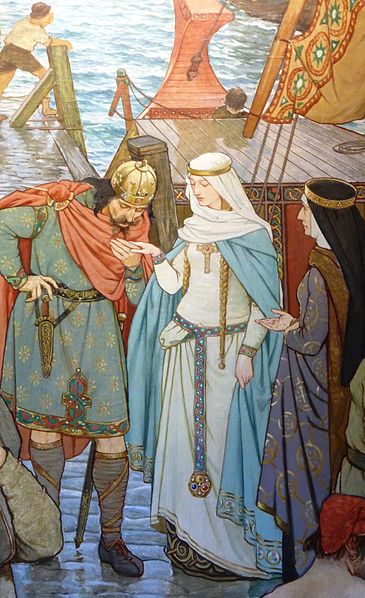A good wife, who can find? She is far more precious than jewels…
Charm is deceitful and beauty is vain, but a woman who fears the Lord is to be praised. (cf., Proverbs 31)
As I write, it is the evening of the memorial of Saint Margaret of Scotland (+1090), the English wife of the Scottish King, Malcolm the Third. Margaret was from noble lineage, daughter of Prince Edward the Exile and grand-daugther of King Edmund Ironside.
But more important than this dynastic union was the spiritual unity of this married couple, testifying in that rough and warlike age that holy and fruitful matrimony is not only possible, but necessary, even in the darkest of times.
Margaret’s virtue and piety, her dedication to her religious duties and the poor, were encouraged by her rough and illiterate husband. Malcolm perhaps did not see the full importance of his wife’s spirituality and charity, but he saw enough, and love did the rest. They had eight children together, including the future king and saint, David of Scotland.
We live in an age where marriage, sadly, is no longer valued, even amongst all-too-many Catholics. Women do not ‘need’ men, and men, in the main, feel bereft. The State, a coddling and soul-numbing bureaucracy and its technological tentacles have supplanted what men used to provide. In fact, in many households (it is difficult to get accurate numbers on these things, but many anecdotes and personal stories suffice for some evidence), it is the woman who supports the man and their children, often by some sort of government job, replete with benefits and generous maternal, sorry, parental, leave.
Rarely do I see, again even amongst Catholic families, that they have any issue with encouraging their daughters to join the military, police force, firefighters, nor with their daughters going forth into full-time careers, requiring years of training, with marriage and family on the back-burner; as a natural consequence, men hide out in basements and man-caves, doing what they do when entropy rules.
Prescinding from the other current moral problems in many professions (just this morning, our once-noble Canadian military is holding a ‘transgender job fair’, with some senior officer praising such ‘diversity’), I ask: What society ever had its women defending and rescuing its men? What man, holding his children, wants to bid his wife and their mother farewell, as she goes off on a tour of duty, while he remains at home?
Just because a woman might be able to fire a gun, or make the primary wage, does not mean that she should. That is, if there are still men around to take care of such things as defending one’s country or bringing home what is needed for the running of the house. But ‘husband as protector provider’ has such a quaint and far-off mediaeval, or perhaps western-frontier, ring to it now.
So witness the retreat of man, of masculinity, of the proper authority of fatherhood, something that can only be achieved if it is welcomed and encouraged by the proper receptive genius of woman, as wife, as mother, as the heart and centre of what used to be the ‘home’, but which is too often just a quasi-hotel, where people sleep, then go to work all day, maybe, often not, showing up for dinner, hastily prepared, or some sort of take-out. Even if it’s healthy kale-salad, with cranberries and spinach and feta cheese, is it really all that good for the family?
As the family goes, so goes society, warned John Paul II, and the family in any true Christian sense has by and large packed up and gone.
There are hold-outs, however, pockets of resistance against this age of androgyny, places where, to paraphrase the song, women are women and men are men…
We cannot of course return to the 11th century, with war-like kings wielding claymores and their wives back home at the castle weaving wool, although that does have a nostalgic ring to it. That said, there is still a respective role for men and women to play, as we resist the gravitational pull of the modern world’s sexless denial of this beautiful difference.
The philosopher Thomas Howard’s 1979 book ‘Chance or the Dance’ critiques modern secularism: The title asks the question: Are we living in a dog-eat-dog world of random disorder, with the devil take the hindmost, and marriage nothing more than a contractual ‘partnership’? Or is life an ordered and beautiful dance, where each of us has his role to play?
And just like a waltz, just because a woman can lead, does not mean that she should.
So man up, men: Esto vir. Like beautiful Margaret getting off that boat on the shores of the Firth at Queensferry in bonnie Scotland all those years ago, there are still a lot of good women out there still searching and waiting for a good man.

